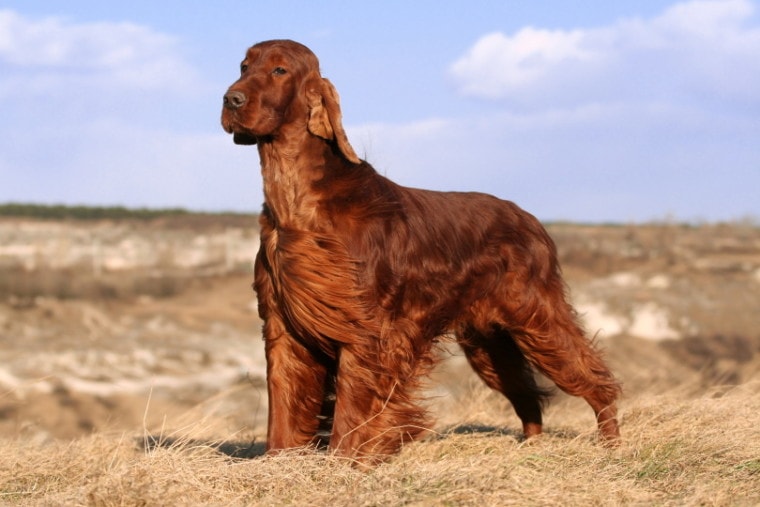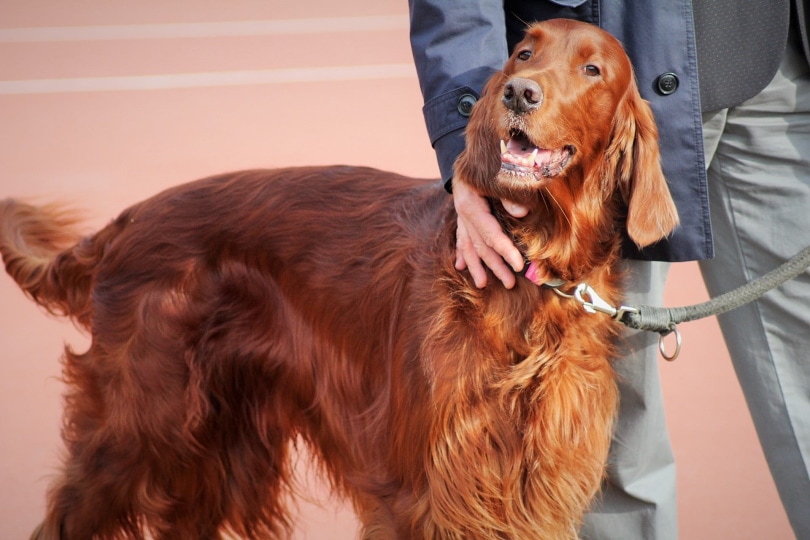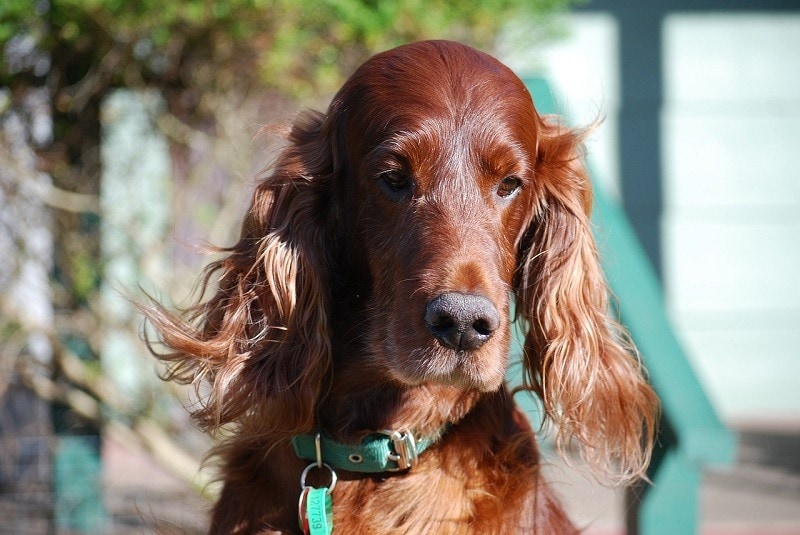
Click Below to Skip Ahead
As the fun-loving redheads of the dog world, the Irish Setter is easily one of the most beloved dog breeds available. These sporting dogs love to run and frolic but also enjoy showing their affections to their families.
Breed Overview
Height:
24-27 inches
Weight:
60-70 pounds
Lifespan:
11-15 years
Colors:
Chestnut, mahogany, and red
Suitable for:
Active families, couples, and singles with adequate room
Temperament:
Loyal, playful, intelligent, easy to train, friendly, gets along with other dogs
This breed works well with most people as long as adequate room is given for running and playing. The Irish Setter gets along with humans and dogs alike and is considered one of the most friendly and outgoing dog breeds available.
Many people recognize the Irish Setter from its silky mahogany or chestnut coat. Their lean build, strong legs, and great speeds are why they were first used as sporting dogs before making their way into the hearts of people around the world. If you’re ready to learn more about this amazing breed, read below to get more Irish Setter traits and facts.
Irish Setter Characteristics
Irish Setter Puppies

Bringing home a new puppy is a huge responsibility to take on. Whether you are a novice dog owner or consider yourself quite knowledgeable, learning more about your chosen dog breed can make your life easier. While Irish Setter puppies are relatively low in maintenance, here is a look at the characteristics you should expect to shine while spending time with these beautiful pups.
Irish Setters are great family dogs, good with kids and other pets too! Here’s an overview of this beautiful dog breed.
Temperament & Intelligence of the Irish Setter

Irish Setters are a highly intelligent dog breed. This makes them relatively easy to train. These lovable dogs are also easy-going and fun-loving. Great for most people, the Irish Setter needs room to roam and a family to love.
Are These Dogs Good for Families? 👪
Yes, Irish Setters are great for families. These rambunctious dogs love children, adults, and other dogs. The kids can spend hours playing fetch and burning off their energy with these dogs. Adults also get the advantage of having a fun-loving and adventurous dog that loves showing their affection and loyalty to their families.
Does This Breed Get Along with Other Pets?
Yes, Irish Setters get along well with other dogs. When being introduced to smaller animals like cats, you should take precautions. With this breed’s hunting background, taking your time with introductions is the best way to go. This will protect your cat and dog from a scary situation.
Things to Know When Owning an Irish Setter:
Making sure you’re ready to give your Irish Setter a good life is crucial before bringing one home. Learning more about their dietary needs, how much exercise they require, and how best to keep them properly groomed will allow you to provide your pup with a safe and healthy environment in which to grow.

Food & Diet Requirements 🦴
As a puppy, it is best to start your Irish Setter on high-quality puppy food. Due to their high energy levels, puppies will need to eat at least three or four times a day. This amount of food is required to keep them healthy while they grow and refuel them as they run off their excess energy.
Adult Irish Setters also need high-quality kibble. Although they may not require the high amounts puppies need, they should still be well-fed due to their size. If your Irish Setter seems to be on the smaller size, increasing their intake may be needed considering how active they are.
Irish Setters can also eat raw foods if the owners prefer. If this is the diet you decide to follow, remember to only offer your dog the best quality of meats and veggies possible. This will keep them healthy and avoid issues with an upset stomach.
Exercise 🐕
Irish Setters require a lot of exercise. These dogs want to stay on the go constantly. Having a large backyard for them to run and play in is a great way of letting them burn off their energy. If the family has kids, letting the kids run and play with these dogs is another way to ensure they get adequate exercise. Just remember, an Irish Setter is active, so people who enjoy an active lifestyle are often the best owners for this dog breed.

Training 🎾
Irish Setters are fairly easy to train. Thanks to their intelligence and yearning to please their owners, you’ll find it easy to teach your dog proper house etiquette and ways of behavior. Keep in mind, however, that Irish Setters can be a bit stubborn. This is why it’s best to start training early to help them learn the rules of the house. This breed may also be a bit of an airhead. Use patience when training as they may not always pay attention but will provide you with fun antics while training is taking place.
Grooming ✂️
Dogs with silky coats, like the Irish Setter, should be bathed routinely, every 4-6 weeks. This helps care for their coats. When it comes to this dog breed, you’ll quickly learn that grooming is a necessity that requires a lot of time and patience.
Due to their long hair, Irish Setters must be brushed often. This keeps their lustrous coats manageable and looking their best. If you plan on allowing your Irish Setter to take part in shows, you’ll also want to keep their coat trimmed to accentuate their neck and head.
Trimming the hair inside the ears will help keep your pet more comfortable. Due to the long coats and floppy ears of this dog breed, you should ensure their ears stay clean and free of tangled hair.
You should clip your Irish Setter’s nails routinely. This will help avoid the pain and discomfort associated with running and playing with long nails.
Keeping your pet’s teeth cared for properly will help you avoid trips to the vet for painful oral issues. Doing this at least twice a week will help avoid tartar buildup and other oral problems.

Health and Conditions 🏥
Irish Setters are normally a healthy breed. It’s important to remember, however, that any breed can experience health issues at some point in time. Routine veterinarian visits will help monitor for possible illnesses and keep your dog feeling their best.
Male vs Female
Choosing whether you take home a female or male Irish Setter is mostly a personal preference. The only physical difference between the two is size. Male Irish Setters are slightly taller than females. The real differences come in their attitude. Females of this breed, like many others, may be quicker to show aggression. Luckily, when it comes to the Irish Setter this isn’t normally a big issue and can be corrected if done early.
 3 Little-Known Facts About the Irish Setter
3 Little-Known Facts About the Irish Setter
1. Irish Setters Mature Slowly
Irish Setters mature slower than other dog breeds. As an owner of these dogs, you’ll quickly learn that their bodies grow at a normal rate while their mind stays in puppy mode for quite a bit longer. It may take some time and a bit of training due to their stubbornness, but Irish Setter pups will mature into well-mannered dogs.
2. Elcho Was a Trailblazing Irish Setter in the US
An Irish Setter was brought to the United States by Charles H. Turner in 1870. This dog was named Elcho. He went on to sire over 197 puppies to help build the breed in the States while also being the first Irish Setter to win a US championship.
3. Irish Setters Weren’t Always Red
While most of us expect to see a red-colored Irish Setter, this wasn’t always the case. Originally, hunters preferred Irish Setters to be red and white. They claimed this made it easier to spot them in the field while they were on the hunt.

Summary
The Irish Setter is an amazing dog breed to make part of your family. If you lead an active lifestyle or feel you have the ability to keep up with the breed’s high-energy lifestyle, you’ll quickly learn that these playful dogs are comical and easy to love. These dogs will quickly make their way into your homes, lives, and especially hearts when you give them a chance.
You may also be interested in:
- Golden Irish (Golden Retriever & Irish Setter Mix)
- 150+ Irish Setter Names: Unique, Popular & Best Ideas
Featured Image Credit: Reddogs, Shutterstock








